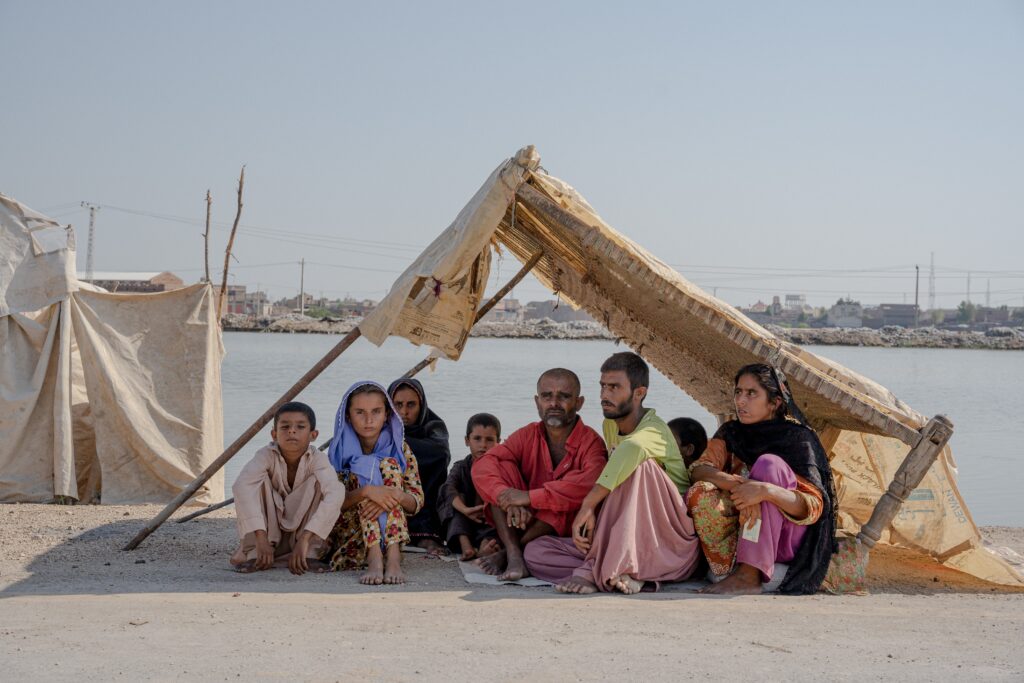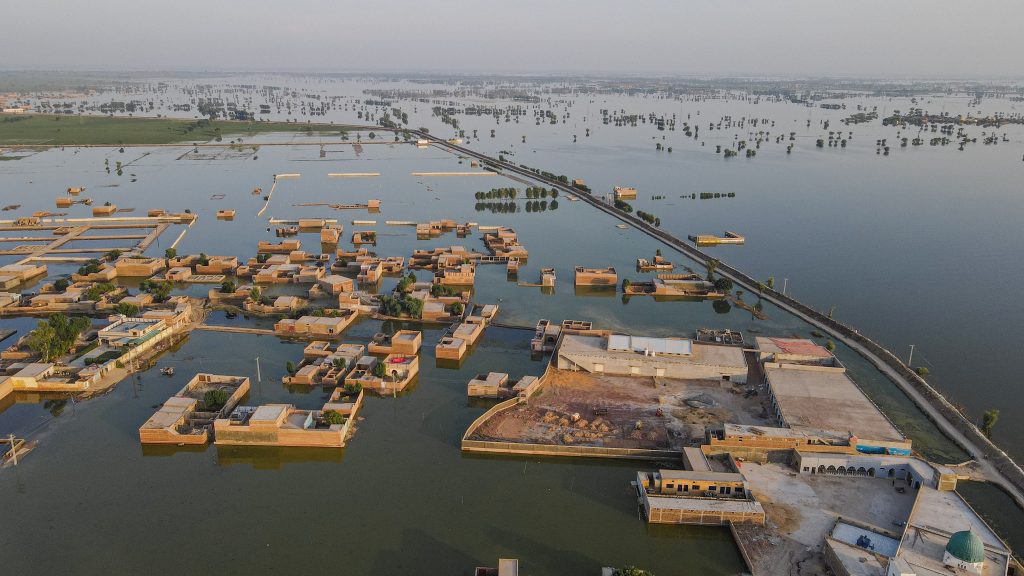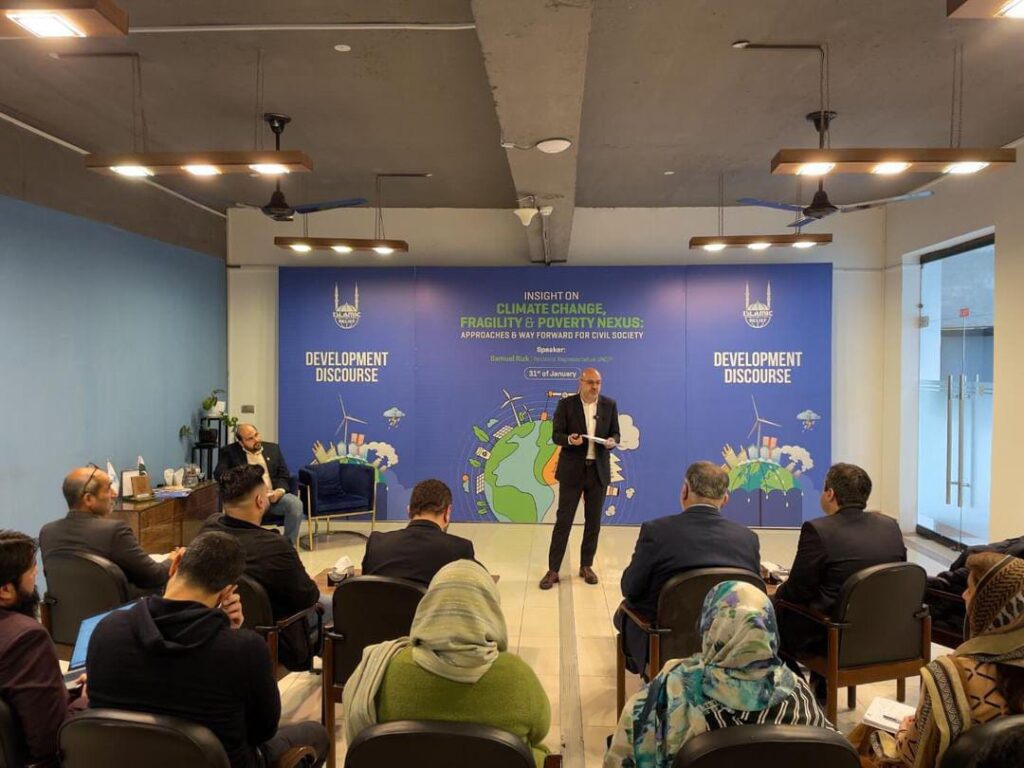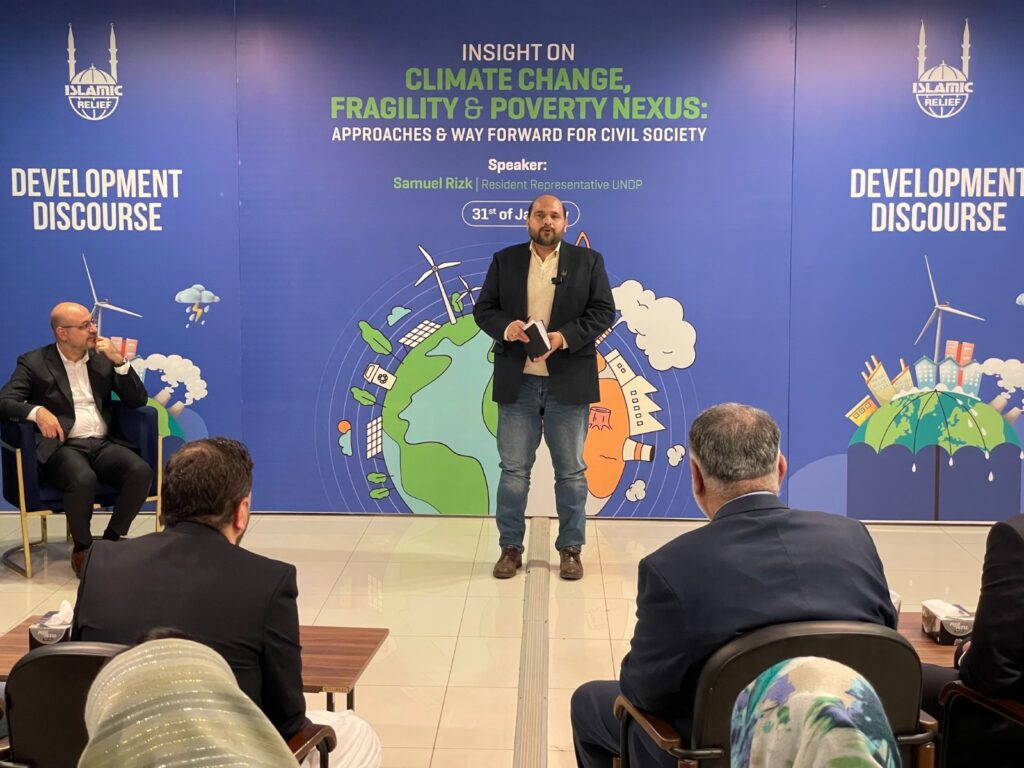The climate-induced catastrophe of 2022 in Pakistan left an indelible mark on the nation, amplifying existing vulnerabilities and plunging many communities deeper into poverty. As extreme weather events wreaked havoc across the country, the intertwined dynamics of fragility and poverty became starkly evident. From the loss of livelihoods to the displacement of populations, the repercussions of this catastrophe reverberated far beyond the immediate devastation, underscoring the urgent need for holistic approaches to address both climate resilience and poverty alleviation.

Two years back, Pakistan endured devastating droughts and floods that fractured infrastructure, lives, and livelihoods on a massive scale. Firstly, a deadly heatwave, previously a 1-in-1000-year event, saw temperatures rise continuously above 45°C, leading to crop and livestock losses along with forest fires. After that came the unprecedented monsoon rains, the heaviest ever recorded. Across the country, hundreds of lives were lost, millions were displaced, and around 2 million houses were either partially damaged or completely destroyed. Critical infrastructure such as roads and dams were washed away, 22,000 schools were damaged and forced to close, and for many, there was a near-complete loss of livestock and kharif crop. With damages of up to 30 billion USD, floods of 2022 fueled by climate change gave a near knock-out blow to growth of Pakistan.
Pakistan needs new investments, beyond recovery and rehabilitation aid, to support climate as well as to build the resilience of the country to future climate shocks. As a direct consequence of the floods, the national poverty rate also increased significantly, pushing millions more into poverty. According to World Bank, the calamity-affected districts were already poorer than the national average, with an average poverty rate of 31.4 percent compared to 21.9 percent nationally. As per NDMA, the poverty rate increased by 3.7 to 4 percentage points.

With the rising likelihood of climate induced disasters, the impacts on Pakistan’s people and their livelihoods, on poverty, on ecosystems and the economy will grow even worse. An immediate action is essential—and rightly so. It will require firm, clear decisions from the government and meaningful engagement of all relevant stakeholders including UN agencies, I/NGOs, media, academia, think tanks and most importantly the entire population in the effort to turn the situation around. With international support, the country needs fundamental shifts in its development path and policies, requiring substantial investments in people-centric climate adaptation and resilience.
As per the reports of The World Bank, the combined risks of extreme climate-related events, environmental degradation, and air pollution are projected to reduce Pakistan’s GDP by at least 18 to 20% by 2050. This will stall progress on economic development and poverty reduction.
An opportunity to make an immediate start is at hand. The reconstruction and rehabilitation from the floods need to be climate-resilient, inclusive, and people-centric, leveraging the potential of local communities. At the same time, Pakistan needs to build on the lessons learnt from the floods in order to build longer-term resilience as a hedge against future climate shocks.
Stumbling on numbers, Pakistan is on course to meet only 35 out of 169 SDG targets by 2030. The macroeconomic landscape, compounded by factors like COVID, poor air quality, and issues with neighboring countries, contributes to setbacks, placing Pakistan high on the fragile state index. The debt crisis is the cherry on top, painting a less-than-ideal picture for the country. The repercussions of climate change on fragility and poverty are starkly evident; even after more than a year, individuals who lost their homes and livelihoods still lack shelters. It has been more than a year now and we are far from rebuilding two million houses. Only 5% of the houses have been built till now.
The goal is to build back better and stronger but the delayed outreach to these individuals after a year and a half is almost welcoming them back to extreme poverty, according to Samuel Rizk, Resident Representative UNDP.
On the flipside of fragility lies resilience; coping with the crisis. UNDP Pakistan’s Resident Representative Samuel Rizk expressed his views and defined resilience as the ability to flex but not break but one year later to the Geneva conference the situation remains the same. The 4Rs framework policy (Resilient Recovery, Rehabilitation, and Reconstruction) came out but progress remains inadequate in proportion to the magnitude of the disaster. Building capacity of communities is critical to give the local communities another chance at life.
In this backdrop, prosperity agenda for Pakistan requires a collective effort to offer suggestions and meaningful ideas to the incoming government and to assist them in implementing crucial reforms. Mr. Rizk also stressed upon the need to be prepared as another climate crisis might happen sooner than our expectations. We are living in a time where the impact is multidimensional, everything is happening all at once; cost of living is increasing, climate is changing and conflicts are expanding etc. The solution to this multidimensional impact is multidimensional response but in a country as big and dense in terms of population, the real challenge is the scale and scope of action. This is where climate financing and climate justice comes in as finance and investment are pivotal for addressing the growing needs of the country. Investors are increasingly interested in sectors like fintech and agritech, making events like COP 26, 27, and 28 attractive to people, businessmen, private sectors, and heads of states, as this is where the future lies.

Pakistanis need to welcome innovativeness to combat climate change. Old knowledge and techniques are yielding no results anymore. This is where green solutions and blue technologies come in to play. By prioritizing green solutions and blue technologies, Pakistan can not only mitigate the impacts of climate change but also foster sustainable development, improve livelihoods, and build resilience to future environmental challenges. However, successful implementation will require coordinated efforts across government, civil society, the private sector, and local communities, as well as adequate financing and capacity-building support.
Rizk engaged in enriching conversation with the audience where responding to questions, he dilated upon the nexus of poverty, fragility and climate change, Mr. Rizk discussed the dilemma of addressing two-third of the problem which effects the impact of solutions in the longer run. He termed civil society’s strong engagement, financially abled women and global support as the determinants to steer Pakistan out of economic and climate crisis. In addition to these, another factor is prioritizing digitalization is also crucial for inclusive development, offering a cost-effective and accessible solution. Promoting digital literacy and ensuring widespread access are vital components of this approach.
Concluding the insightful discussion, Asif Sherazi Country Director, Islamic Relief Pakistan lamented at the reactionary approach of Pakistan towards disasters. Pakistan’s future lies in early climate adaptation. The communities with all other stakeholders should work together in synergy to create a sustainable development a reality.
The funding landscape has also evolved. We do not have traditional donors as well as long term programmes like before. Following this, we need to change ourselves and realize that ‘Business as Usual’ will not yield any results. This also highlights the need for continuous learning and development in Pakistan.

Building upon the argument, Mr. Sherazi highlighted the significance of partnerships undertake appreciative inquiry of climate change challenges across the landscape of Pakistan that should contributed in paradigmatic shift of development planning and delivery mechanisms.
“Development Discourse is an initiative by Islamic Relief Pakistan to have solution focused talks by key development and humanitarian practitioners addressing Pakistan’s most critical challenges at hand. ‘Interconnectedness between Climate Change, Fragility and Poverty Nexus: Approaches and way forward for civil society’ was the first session in which Mr. Samuel Rizk, Resident Representative of UNDP Pakistan shared his thoughts and wisdom”.